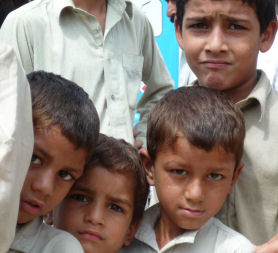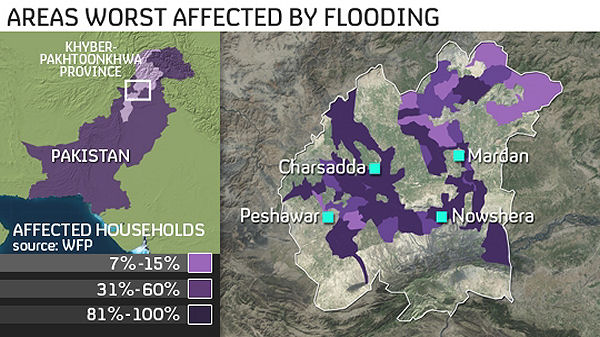Pakistan flood Islamist charities deny terror links
Channel 4 News Foreign Affairs Correspondent Jonathan Miller travels to north west Pakistan and meets the Islamist charities stepping in to distribute food, blankets and clean water.
I’ve just shared chai and custard creams with members of the Islamist charity foundation Falah-e-Insaniat, which shares the same leader as Lashkar-e-Toiba, the militant group which carried out the Mumbai attacks – and is listed as a terrorist organisation by the United Nations.
The charity is one of several hard-line Islamist groups to have filled the void left by the government in the distribution of relief aid to victims of the monsoon floods. In six days travelling widely around northwest Pakistan, we have not seen a single government agency distributing aid, other than some army helicopters, which only fly when the rain stops.
On the other hand, the Islamist groups – including Falah and the al-Khidna Foundation – are everywhere, dispensing medical aid, food and shelter. The Falah representatives I spoke to this afternoon claim to have reached up to 175,000 people across three provinces.

I sat and talk to a devout group of Falah officials in the tented compound they’d set up on the main road near Nowshera, 30 miles east of Peshawar in the province of Khyber Pakhtunkhwa.
The temperature was well over 40 degrees and rivers of perspiration ran down the face of their spokesman, Atiq Chohan, and into his thick black beard.
“When the water level recedes, many more bodies will be found. Some villages you cannot even enter because of the smell of the dead.” Atiq Chohan
“Our people have been in many, many villages,” he said. “We believe one million homes have been destroyed in Khyber Pakhtunkhwa alone. When the water level recedes, many more bodies will be found. Some villages you cannot even enter because of the smell of the dead.”
If his estimate is accurate, the numbers affected by the floods in the region could be even higher than government estimates.
I broached the question of Falah’s genealogy and pedigree among jihadi militants. “No, no, no,” he insisted, “we have absolutely nothing to do with terrorism. There is no truth at all in any of the reports that we are associated with terrorists.
We have no link with Lashkar-e-Toiba or Jamaat-ud-Dawa.” Both of these groups are banned by the government of Pakistan.
Last week we encountered Falah-e-Insaniat whose name translates as “Humanitarian Welfare”, in western Punjab. They were feeding rice to flood victims under a banner bearing the organisation’s insignia: a long black sword.
This afternoon, the Pakistan government’s National Disaster Management Authority held a news conference in which, bizarrely, it denied that any Islamist groups were providing aid in flood-hit regions.
Information Minister Samsam Bukhari said only federal and provincial government agencies have access to affected areas. “People are already victims of terrorism,” he said, “and they have nothing to do with these outfits.”
I told Mr Chohan that western countries in particular were concerned by the overt presence of his organisation in the aftermath of the flood, because of their widely perceived association with Islamist terror. He smiled back: “Our work is simply to serve the people, who are in trouble and are needy. Our job is to bring people closer to Almighty Allah.”
This afternoon I watched Falah feed large numbers of children with biscuits, cake and mango juice. Each child received a blessing as they reached out for their food. Huge quatities of rice and nuts and raisins were cooked for adults. Men and women sat and ate separately.
Nearby, Falah-e-Insaniat have a warehouse, where flood-victim survival packs are being assembled by 300 volunteers, the contents paid for by donations. I witnessed people stopping by the roadside and dropping off bottles of fizzy drinks and cartons of snack food for the group to distribute.

Most interestingly of all, the Falah representatives told me that mobile teams had been deployed into rural villages throughout the region to hand out cash: Rs3,000-5,000 (£22 – £36) per family.
This far outstrips anything the government of Pakistan has so far done. Those who closely monitor the activities of the Islamist charities say they have hugely increased their credibility since the flood. We have encountered widespread anger and resentment over the government’s inadequate response. The concern is that as the Islamists fill that vacuum, their ideology and influence will also spread.
Five years ago I watched other hard-line groups, including an earlier incarnation of Falah-e-Insaniat, distribute aid in Kashmir after the earthquake. I asked Mr Chohan whether the experience gained in the quake had helped in their response to the flood.
More Pakistan floods coverage from Channel 4 News
Pakistan floods: aid not getting through
Four million at risk from Pakistan floods
No respite from Paksitan floods one month on
“We gained a lot of experience during the earthquake,” he said. “And we are implementing this now. People also know that they can make their donations to us and they trust us to distribute what they give. We have invited the government of Pakistan to distribute their aid through our networks too.”
He didn’t say whether Falah had had any response. But I can’t imagine the government will be particularly imressed by the Islamists’ munificent offer.
As we made moves to leave, Atiq Cholam invited us to eat rice with them. I too decided to decline his offer. There were hungrier mouths to feed.
-
Latest news
-
Local Elections Debate: voters question five main parties41m

-
Local Elections: Conservatives face 400 seat loss exclusive analysis reveals4m

-
Post Office Inquiry: ‘no cover-up’ insists former executive2m

-
Scotland politics: SNP leader future in doubt after opposition move3m

-
Military horses rampage through streets of London2m

-




